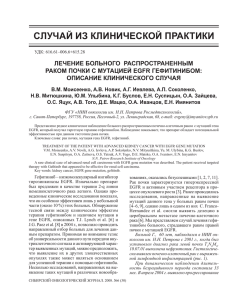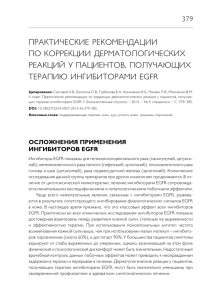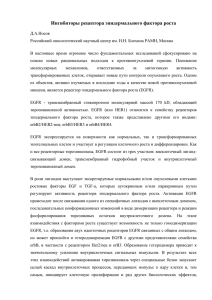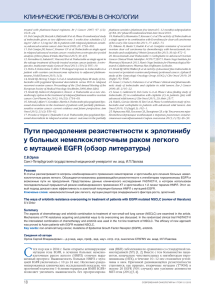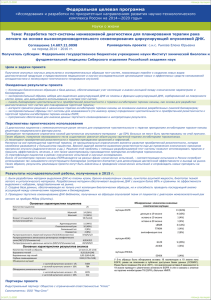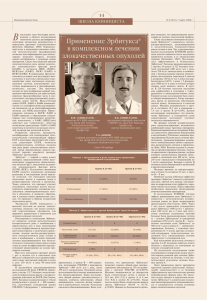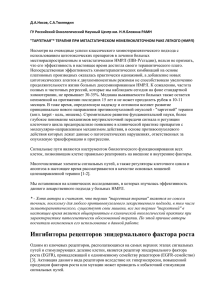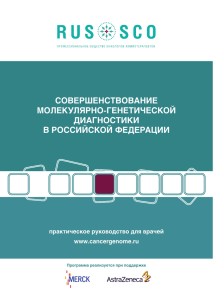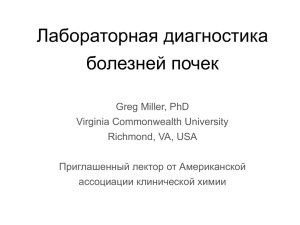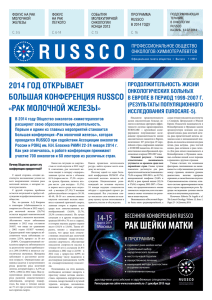блокада биосинтеза холестерола на этапе с4
advertisement
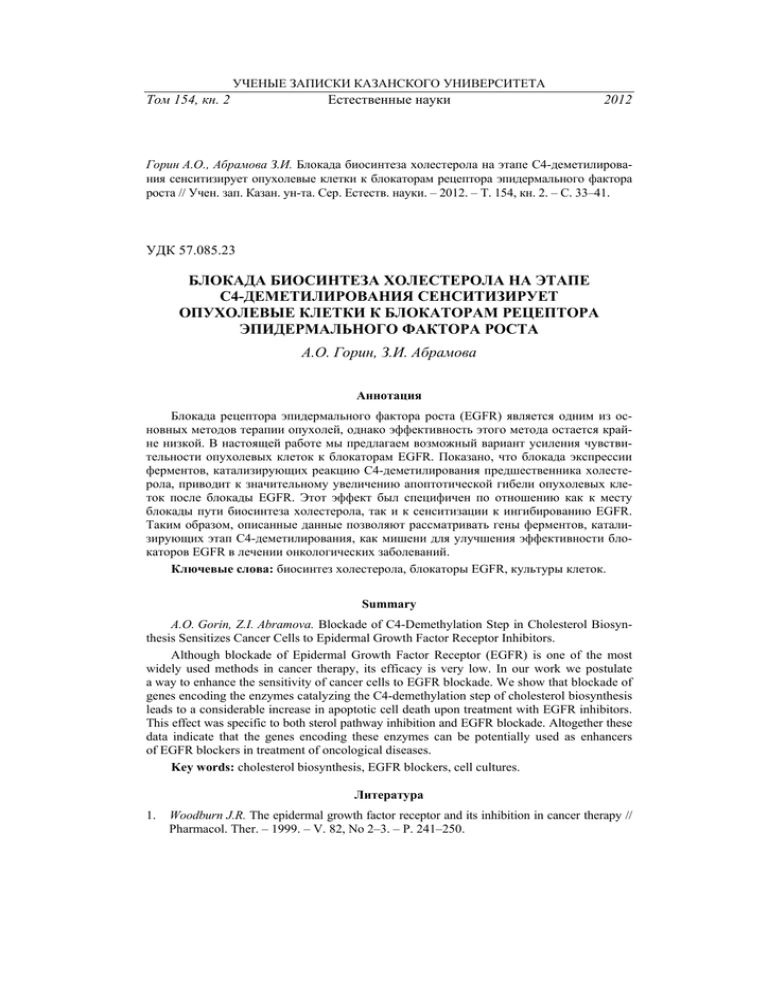
УЧЕНЫЕ ЗАПИСКИ КАЗАНСКОГО УНИВЕРСИТЕТА Том 154, кн. 2 Естественные науки 2012 Горин А.О., Абрамова З.И. Блокада биосинтеза холестерола на этапе С4-деметилирования сенситизирует опухолевые клетки к блокаторам рецептора эпидермального фактора роста // Учен. зап. Казан. ун-та. Сер. Естеств. науки. – 2012. – Т. 154, кн. 2. – С. 33–41. УДК 57.085.23 БЛОКАДА БИОСИНТЕЗА ХОЛЕСТЕРОЛА НА ЭТАПЕ С4-ДЕМЕТИЛИРОВАНИЯ СЕНСИТИЗИРУЕТ ОПУХОЛЕВЫЕ КЛЕТКИ К БЛОКАТОРАМ РЕЦЕПТОРА ЭПИДЕРМАЛЬНОГО ФАКТОРА РОСТА А.О. Горин, З.И. Абрамова Аннотация Блокада рецептора эпидермального фактора роста (EGFR) является одним из основных методов терапии опухолей, однако эффективность этого метода остается крайне низкой. В настоящей работе мы предлагаем возможный вариант усиления чувствительности опухолевых клеток к блокаторам EGFR. Показано, что блокада экспрессии ферментов, катализирующих реакцию С4-деметилирования предшественника холестерола, приводит к значительному увеличению апоптотической гибели опухолевых клеток после блокады EGFR. Этот эффект был специфичен по отношению как к месту блокады пути биосинтеза холестерола, так и к сенситизации к ингибированию EGFR. Таким образом, описанные данные позволяют рассматривать гены ферментов, катализирующих этап С4-деметилирования, как мишени для улучшения эффективности блокаторов EGFR в лечении онкологических заболеваний. Ключевые слова: биосинтез холестерола, блокаторы EGFR, культуры клеток. Summary A.O. Gorin, Z.I. Abramova. Blockade of C4-Demethylation Step in Cholesterol Biosynthesis Sensitizes Cancer Cells to Epidermal Growth Factor Receptor Inhibitors. Although blockade of Epidermal Growth Factor Receptor (EGFR) is one of the most widely used methods in cancer therapy, its efficacy is very low. In our work we postulate a way to enhance the sensitivity of cancer cells to EGFR blockade. We show that blockade of genes encoding the enzymes catalyzing the C4-demethylation step of cholesterol biosynthesis leads to a considerable increase in apoptotic cell death upon treatment with EGFR inhibitors. This effect was specific to both sterol pathway inhibition and EGFR blockade. Altogether these data indicate that the genes encoding these enzymes can be potentially used as enhancers of EGFR blockers in treatment of oncological diseases. Key words: cholesterol biosynthesis, EGFR blockers, cell cultures. Литература 1. Woodburn J.R. The epidermal growth factor receptor and its inhibition in cancer therapy // Pharmacol. Ther. – 1999. – V. 82, No 2–3. – P. 241–250. 2. Di Nicolantonio F., Martini M., Molinari F., Sartore-Bianchi A., Arena S., Saletti P., De Dosso S., Mazzucchelli L., Frattini M., Siena S., Bardelli A. Wild-type BRAF is required for response to panitumumab or cetuximab in metastatic colorectal cancer // J. Clin. Oncol. – 2008. – V. 26, No 35. – P. 5705–5712. 3. Erjala K., Sundvall M., Junttila T.T., Zhang N., Savisalo M., Mali P., Kulmala J., Pulkkinen J., Grenman R., Elenius K. Signaling via ErbB2 and ErbB3 associates with resistance and epidermal growth factor receptor (EGFR) amplification with sensitivity to EGFR inhibitor gefitinib in head and neck squamous cell carcinoma cells // Clin. Cancer Res. – 2006. – V. 12, No 13. – P. 4103–4111. 4. Turke A.B., Zejnullahu K., Wu Y.L., Song Y., Dias-Santagata D., Lifshits E., Toschi L., Rogers A., Mok T., Sequist L., Lindeman N.I., Murphy C., Akhavanfard S., Yeap B.Y., Xiao Y., Capelletti M., Iafrate A.J., Lee C., Christensen J.G., Engelman J.A., Jänne P.A. Preexistence and clonal selection of MET amplification in EGFR mutant NSCLC // Cancer Cell. – 2010. – V. 17, No 1. – P. 77–88. 5. Guix M., Faber A.C., Wang S.E., Olivares M.G., Song Y., Qu S., Rinehart C., Seidel B., Yee D., Arteaga C.L., Engelman J.A. Acquired resistance to EGFR tyrosine kinase inhibitors in cancer cells is mediated by loss of IGF-binding proteins // J. Clin. Invest. – 2008. – V. 118, No 7. – P. 2609–2619. 6. Krause S.A., Gray J.V. The functional relationships underlying a synthetic genetic network // Commun. Integr. Biol. – 2009. – V. 2, No 1. – P. 4–6. 7. Astsaturov I., Ratushny V., Sukhanova A., Einarson M.B., Bagnyukova T., Zhou Y., Devarajan K., Silverman J.S., Tikhmyanova N., Skobeleva N., Pecherskaya A., Nasto R.E., Sharma C., Jablonski S.A., Serebriiskii I.G., Weiner L.M., Golemis E.A. Synthetic lethal screen of an EGFR-centered network to improve targeted therapies // Sci. Signal. – 2010. – V. 3, No 140. – P. ra67. 8. Brown A.J. Cholesterol, statins and cancer // Clin. Exp. Pharmacol. Physiol. – 2007. – V. 34, No 3. – P. 135–141. 9. He M., Kratz L.E., Michel J.J., Vallejo A.N., Ferris L., Kelley R.I., Hoover J.J., Jukic D., Gibson K.M., Wolfe L.A., Ramachandran D., Zwick M.E., Vockley J. Mutations in the human SC4MOL gene encoding a methyl sterol oxidase cause psoriasiform dermatitis, microcephaly, and developmental delay // J. Clin. Invest. – 2011. – V. 121, No 3. – P. 976–984. 10. Patra S.K. Dissecting lipid raft facilitated cell signaling pathways in cancer // Biochim. Biophys. Acta. – 2008. – V. 1785, No 2. – P. 182–206. Поступила в редакцию 20.03.12 Горин Андрей Олегович – аспирант кафедры биохимии Казанского (Приволжского) федерального университета. E-mail: andrey_gorin@bk.ru Абрамова Зинаида Ивановна – доктор биологических наук, профессор кафедры биохимии Казанского (Приволжского) федерального университета. E-mail: ziabramova@mail.ru
